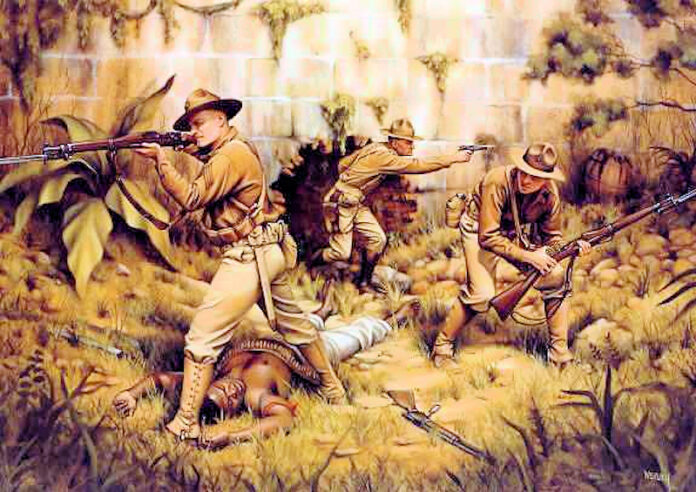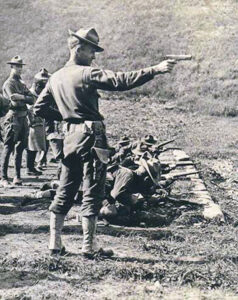
(The second of three articles) (Part 1)
When the Confederacy and U.S. slavery were destroyed by an interracial (though segregated) Union army, Woodrow Wilson had been an impressionable eight-year-old in Augusta, Georgia. Decades later, as a young scholar, he denigrated attempts at fostering racial equality during the post–Civil War Reconstruction era as having “held the South back from her natural destiny of regeneration.” As president, Wilson allowed his cabinet secretaries to resegregate the federal workforce. On Feb. 18, 1915, as the plans for the invasion of Haiti were being finalized, Wilson had hosted a private screening of one of the first movies ever shown at the White House: D. W. Griffith’s Birth of a Nation. Essentially a three-hour-long advertisement for the Ku Klux Klan, the film presented Black characters (portrayed mostly by white actors) as sex-crazed killers. Griffith quoted Wilson’s academic opus, A History of the American People, in the film.
Also at the White House screening was Josephus Daniels, who, as Wilson’s secretary of the Navy, was the senior civilian overseeing the Haiti invasion. Before entering politics, Daniels had edited the News & Observer in Raleigh, North Carolina. In 1898, Daniels used his newspaper to promote the overthrow of a multiracial governing coalition in the nearby city of Wilmington; the white conservative insurrection that followed is considered the only successful domestic coup d’état in U.S. history. In another issue, Daniels published a piece by the Ku Klux Klansman “General” Julian Carr, who declared that “Haiti and Liberia are object lessons for mankind” of the dangers of allowing the “negro balance of power over white civilization.”
In other words, the most senior military and civilian officials who led the invasion of Haiti saw themselves as defenders of a racial order that was challenged by Haiti’s very existence. Left to his own instincts, an unreconstructed racist like Waller — with Lejeune, Daniels, and Wilson above him in the chain of command — might have pursued a policy of extermination in Haiti beyond even what he had attempted on Samar during the Philippine War.

But Waller was increasingly putting his trust in Butler, a Northerner who had grown up in a very different tradition. Butler’s Quaker family abhorred slavery; both Thomas and Maud’s fathers fought for the Union to end it. (Ethel’s grandfather Richard Peters had personally enslaved at least 21 people around Atlanta and used slave labor to build his Georgia Railroad, but Smedley was not close with his in-laws.) Nonetheless, Black Philadelphians rarely lived alongside whites, especially in the cloistered suburbs of the Main Line.
Back in 1899, the University of Pennsylvania had invited a promising young sociologist named W. E. B. Du Bois to study this situation. He quickly identified the root of informal segregation as “color prejudice,” known today as racism. The typical Black Philadelphian had no difficulty understanding he faced a “widespread feeling of dislike for his blood,” Du Bois wrote. But whites in the Quaker City were “quite unconscious of any such powerful and vindictive feeling. They regard color prejudice as the easily explicable feeling that intimate social intercourse with a lower race is not only undesirable but impracticable if our present standards of culture are to be maintained.” This quiet confidence in a white-supremacist ordering of the world meant that in “respectable” white homes like the Butlers’, race was seldom discussed at all.
Butler thus moved through Haiti unencumbered by ghost stories of the Black Republic or ancestral fears of Black revenge, and could think more strategically than his superiors. Instead of directing his Marines to “place no confidence in the natives,” as Waller had on Samar, Butler made efforts to develop good relations with Haitian porters and guides. Rather than seeking to turn the northern plains into a “howling wilderness,” he directed his men to scrupulously follow the rules of engagement — not firing unless they were fired upon. And instead of dismissing their “animal-like babble,” as Stephen Crane had the Afro-Cubans at Guantánamo, he took the time to notice that they were speaking an unfamiliar language, Kreyòl (not “very pure French, much like the Filipino Spanish,” Butler wrote Bunny, analogizing Haiti’s native tongue to Tagalog) — and that it was a disadvantage that none of his Marines spoke it.
Butler turned such insights into a strategy for more effective domination. He was able to perceive and then exploit the fault lines between the Caco insurgents and civilians. In the central Artibonite Valley, he noticed villagers’ frustrations with a Caco commander, Pierre Benoît Rameau, whose men kept stealing their food and water. Butler appealed to the villagers by pledging to protect them, then humiliated Rameau personally by pulling him off his horse. When a Marine sergeant was killed by Cacos a few days later, village women sang a funeral hymn, signaling their shift in loyalty. Rameau was captured soon after. Duly impressed, Waller praised Butler’s “usual energy and judgment” in his report to the commandant.
Butler’s insights became the key to securing America’s imperial foothold in Haiti. Though Butler did not realize it at the time, he was helping invent a new approach to warfare. It would eventually be dubbed counterinsurgency: the combination of military, political, and psychological methods employed by an occupying power with the goal of holistically defeating an armed resistance.
In doing so, he was not rejecting white supremacy but channeling it. A few years later, Butler would explain to a Senate committee: “We were all imbued with the fact that we were trustees of a huge estate that belonged to minors. That was my viewpoint, that was the viewpoint I personally took, that the Haitians were our wards and that we were endeavoring to make for them a rich and productive property, to be turned over to them at such at a time as our government saw fit.”
That paternalism, as the historian Mary Renda has written, “masked as benevolent by its reference to parental care, but structured equally by norms of parental authority and discipline,” became “the cultural flagship of the United States in Haiti.” Because Butler hailed from a place where, as Du Bois had written, white people were “unconscious of” their racism, he was the ideal vehicle for the rebranded form of violence it implied.
***
A century later, a Marine Corps Civil Affairs instructor was standing in his desert combat utility uniform in Quantico, Virginia, preparing to give a lecture on counterinsurgency to a class of 50 Marines. He pushed a plug of chewing tobacco to the side of his lower lip and held up a green paperback. “All right,” he began. “The Small Wars Manual. If you have not read it, read it. It was written back in the 1900s and it still has relevance today. Trust me.”
The manual, codified in 1940, was based on the field notes of early-20th-century Marines. That group included Harold Hickox Utley, who served in Haiti under Butler, then deployed to Nicaragua to fight the original Sandinistas. Along with its more recent successor, the U.S. Army and Marine Corps Counterinsurgency Field Manual of 2006, the little green book provided the basis for what is now known as counterinsurgency doctrine, or COIN.
“He was able to defuse the situation, make enemies back down, give the impression he had more men than he had.”
As the Civil Affairs instructor indicated, the original Small Wars Manual is still prized by Marines; the future Marine major general and defense secretary James Mattis recommended all of his officers reread it before deploying to U.S.-occupied Iraq. As its introduction states: “The history of the United States shows that in spite of the varying trend of the foreign policy of succeeding administrations, this Government has interposed or intervened in the affairs of other states with remarkable regularity, and it may be anticipated that the same general procedure will be followed in the future.”
Because COIN doctrine prioritizes reducing civilian casualties over protecting one’s own troops — part of its goal of winning “hearts and minds” — the doctrine remains controversial among some in the military. As another Marine Civil Affairs instructor remembered his first reaction to hearing about COIN (according to Jennifer Greenburg, the anthropologist who observed the Quantico class described above): “First you want me to kill them . . . now you want me to fucking take care of them? Make up your fucking mind!”
To drive home the importance of COIN and Civil Affairs, the instructor pulled up a history slide. Under black-and-white photos of Marines, most likely in Nicaragua, a caption read:
The Corps protected American citizens and business interests by intervening in the Dominican Republic (1916–1924), Haiti (1915–1934), and Nicaragua (1912–1933). In addition to providing stability and security during these “Small Wars,” Marines developed CA [Civil Affairs] doctrine “on the fly” as they built roads and schools, taught local citizens how to become civil servants, and raised the overall standard of living of these countries.
The instructor highlighted one old Marine in particular as an example to follow. Smedley Butler, he explained, had been successful in Haiti because he had relied less on his gun and more on language, culture, bearing, and restraint. “He was able to defuse the situation, make enemies back down, give the impression he had more men than he had,” the major told the class. In summary, “he bluffed.”
But as Butler and the instructor both knew, there is no such thing as a bloodless counterinsurgency. “We are Marines sent here to put an end to a condition that has become, through years of experience, second nature with these people, and no amount of carefully formed sentences will do the job,” Butler had written his father from northern Haiti in October 1915. “Nothing will but a little shooting.”
(From Gangsters of Capitalism by Jonathan Katz. Copyright © 2022 by the author. All rights reserved. Click here to order the book.)









